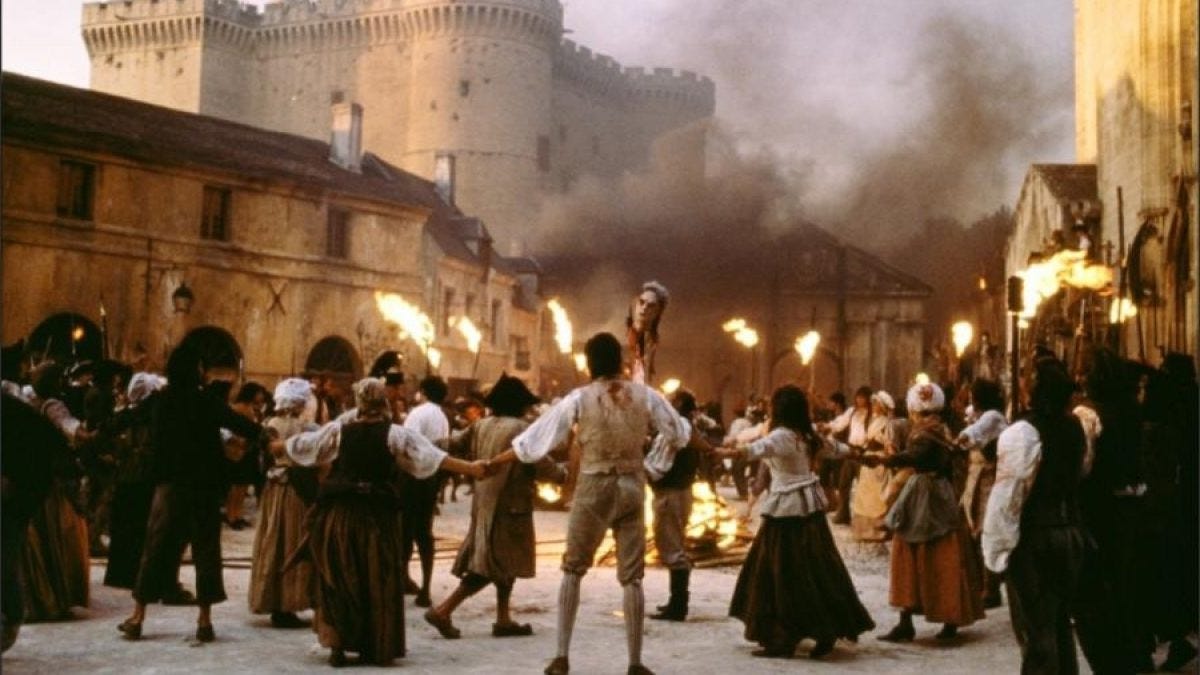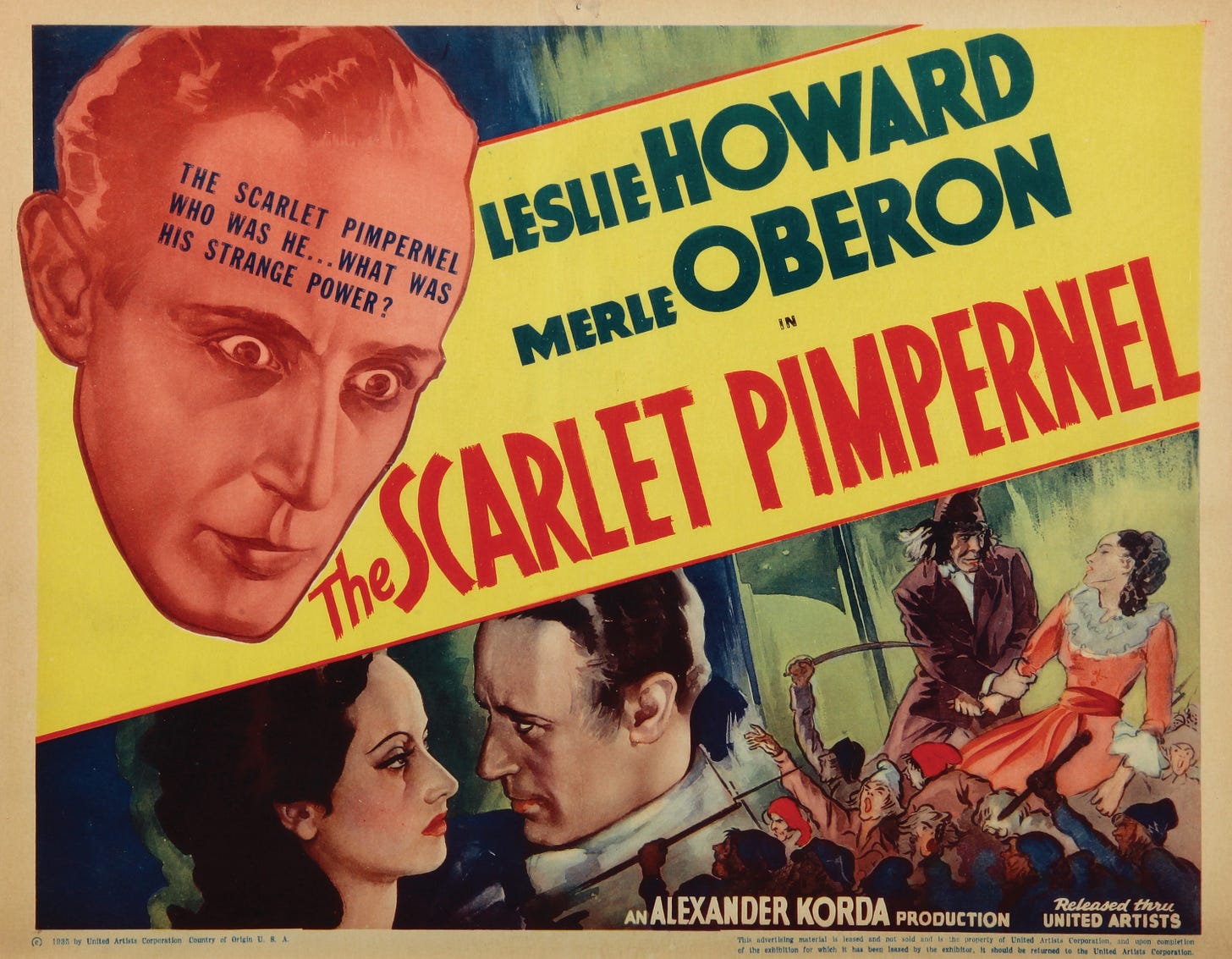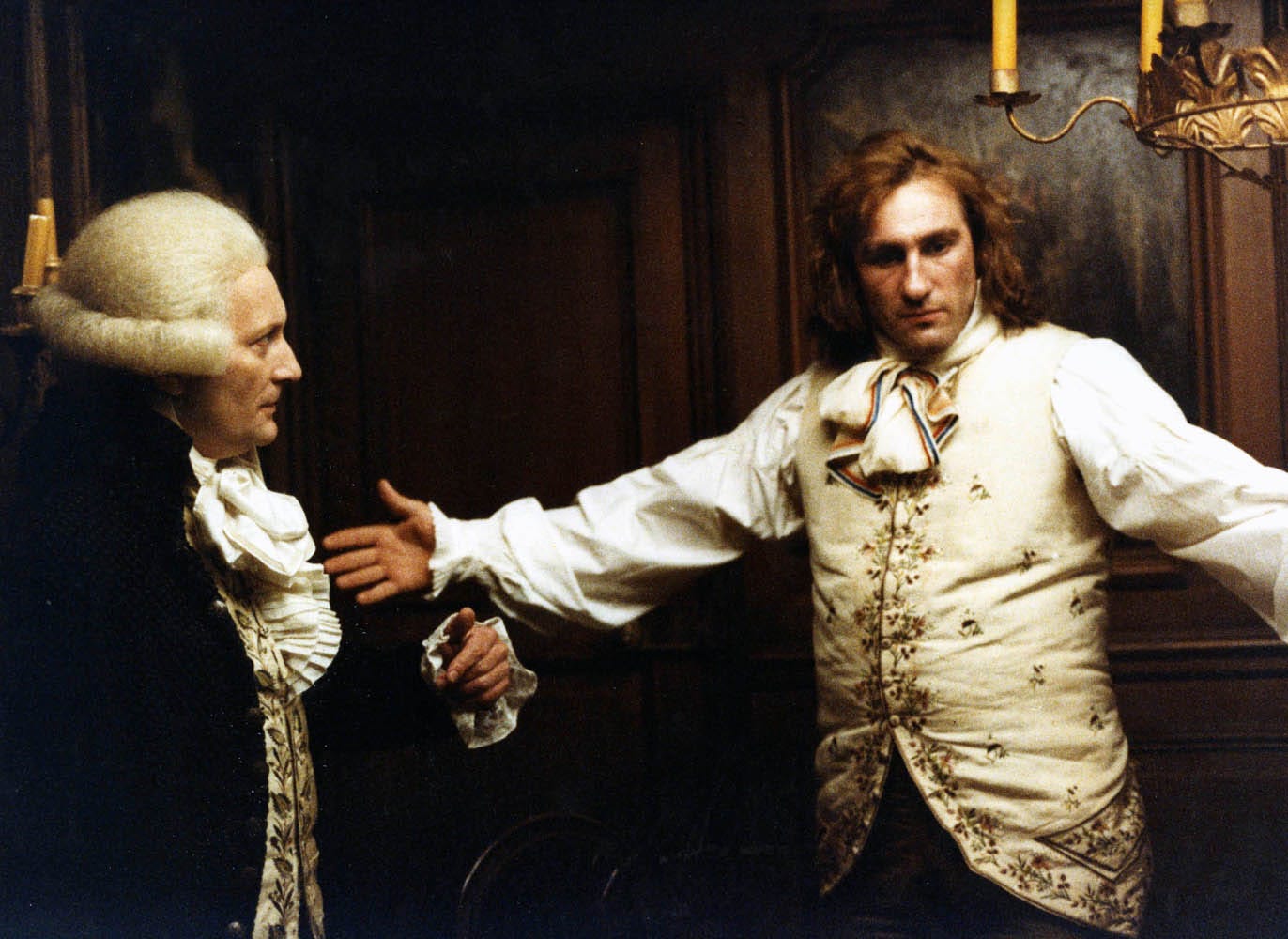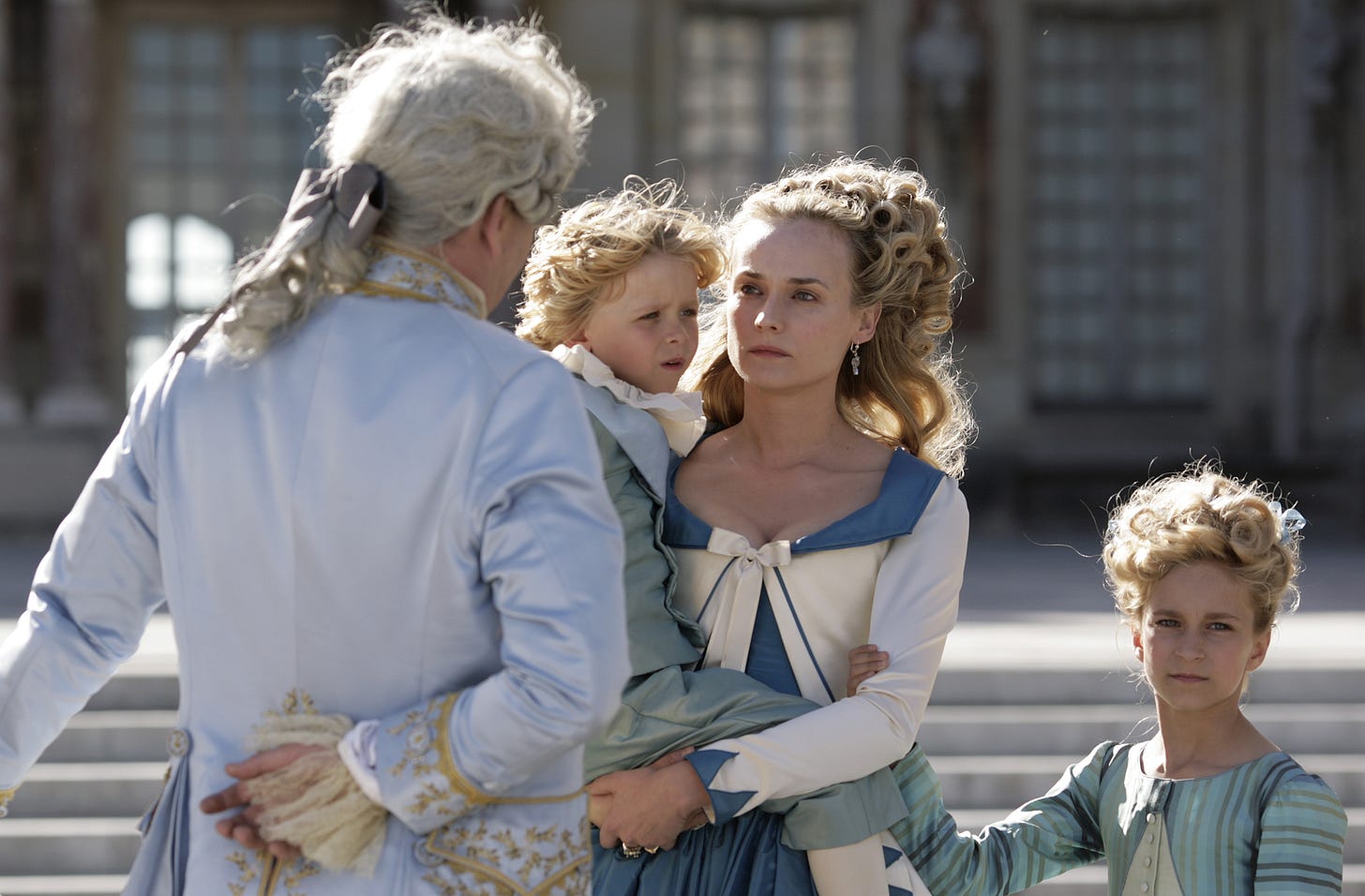This Bastille Day, Here Are the French Revolution Movies to Watch
From the battles for liberty to the dark days of the Terror, screen tales of an age that helped create the modern world.
Few historical events have as much inherent theatricality as the French Revolution, with its colorful cast of characters and dramatic events (even the scaffold of the guillotine is a stage of sorts!). Small wonder, then, that it has generated a great many notable screen adaptations starting with D.W. Griffith’s 1921 silent epic Orphans of the Storm. Here are the ones most worth watching if you feel like a Bastille Day marathon—along with some notes on historical accuracy, to help you sort out fact from fiction.
The Scarlet Pimpernel (1934)
Let’s start with the classic. Yes, it’s incredibly hokey as history goes. (Last time I rewatched it, I practically laughed out loud at a purported shot from a newspaper that referred to Robespierre as the “dictator” of France in May 1792, when the monarchy was technically still in place and the Reign of Terror was still about a year and a half away.) The scenes in which cartloads of aristocrats are taken to the guillotine day after day are ahistorical in a variety of ways: The majority of Terror victims were not from the nobility, and it’s only in the Terror’s final months in the summer of 1794 that large batches of condemned prisoners became a daily spectacle. The story, in which a band of fearless British aristos led by a mysterious figure nicknamed “the Scarlet Pimpernel” perform daring rescues, whisking doomed French aristocrats away practically from the foot of the scaffold, is equally hokey—but it’s tremendous fun. Leslie Howard is brilliant as Sir Percy Blakeney, the English baronet who conceals his identity as the daring Pimpernel underneath the marvelously campy persona of an effete fop; while he certainly steals the show, Merle Oberon is excellent and moving as his French wife Marguerite, who rediscovers her love for her husband when it’s almost too late. Raymond Massey rounds out the main cast as the sinister French ambassador and spy Chauvelin, who is determined to unmask and destroy the Pimpernel. (Historical footnote: the ambassador Chauvelin was a real figure, but far from being an agent for the Jacobins he was imprisoned during the Terror and narrowly escaped being killed.) There’s witty dialogue and a riveting plot—and the final surprise twist is a delight.
Danton (1983)
This remarkable film by the late, great Polish director Andrzej Wajda, which turns 40 this year, draws unmistakable parallels between the Reign of Terror in France in early 1794 and Communist rule in Eastern Europe, including Wajda’s native Poland. At the time, Wajda denied associations between revolutionary France and Soviet-bloc Poland, but the associations are definitely there, from the food lines to the ideological zealotry to the pervasive atmosphere of fear and suspicion to a travesty of a show trial. Danton focuses on a brief but fascinating episode in the Revolution: the clash between Georges Danton, the hugely popular revolutionary leader and orator who turns against the Reign of Terror and tries to use his authority to curb it, and the fanatical Maximilien Robespierre, who believes terror is necessary both to save the Republic from foreign enemies and to vanquish domestic forces of evil and corruption. Danton is memorably played by Gérard Depardieu, then at the height of his craft, charisma, and star power. He gives his Danton, at times, some oddly fey mannerisms; but he certainly captures the man’s well-attested larger-than-life presence and charisma, embodied in his thunderous voice (which finally fails during the trial, signaling Danton’s downfall). The icy, tightly wound Robespierre (Wojciech Pszoniak) is a worthy adversary, and the duo’s verbal battles are at the heart of the film. But Danton offers many other standout moments, including the nightmarish scenes in which the just-arrested Danton witnesses the human misery at the overcrowded Luxembourg prison and realizes that he had a hand in creating this horror.
While it’s certainly not a coincidence that Danton and his friends (notably the journalist Camille Desmoulins) are played by French actors and Robespierre and his associates by Polish ones, the conflict here is not just between Jacobin proto-Bolshevism and the Dantonists’ bourgeois democracy; it’s between life and death, and when the victorious but morally defeated Robespierre hides in his bed under a sheet after Danton’s execution it is clear that he himself has been, in effect, claimed by death. Eminently worth watching and rewatching.
La Nuit de Varennes (1982)

Released almost simultaneously with Danton, this is another classic, by Italian director Ettore Scola. Also like Danton, it portrays an episode that was a turning point in the Revolution: the failed attempt by Louis XVI, then still a constitutional monarch, to flee France with his family in June 1791 and presumably join the anti-revolutionary émigré army. (Due to a series of mishaps, the elaborate plan failed, and the royal family was intercepted in Varennes, near the border of what was then Austrian Netherlands, where the king was recognized by the local postmaster—I kid you not—from his profile on the gold louis coin.) But where Danton focuses on the principals, La Nuit de Varennes (released in the United States as That Night in Varennes) takes the very different approach of offering a (fictional) behind-the-scenes story: a passenger coach traveling the same route as the king’s party and carrying a countess who is a minor accomplice in the flight plan (Hanna Schygulla) as well as several other people, two of them actual historical figures: the visiting American and French Revolution enthusiast Tom Paine (Harvey Keitel) and the eccentric journalist, pornographer, and futuristic visionary Nicolas Restif de la Bretonne (Jean-Louis Barrault). Along the way, the group picks up the Chevalier de Seingalt, a.k.a. Casanova (Marcello Mastroianni), the notorious adventurer who is also on the run—in his case, from the Bohemian castle where he is spending his old age as a librarian. This escape is, of course, pure fiction; for that matter, Paine was not yet in France during the flight to Varennes, either, but the poetic license makes for a great story. As the coach lumbers on, and Bretonne and Paine pick up odd clues to the royal couple’s parallel journey, the travelers talk about everything from politics to art to sex, and sometimes run into ghosts from their past.
In a sense, the film is a meditation on transience, whether it’s the passing of Casanova’s and Bretonne’s libertine careers or the passing of the ancien régime. Scola is sympathetic to the spirit of democratic change represented by Paine (whose support for revolution does not keep him from showing human decency to its enemies, as when he saves the countess from sexual assault by a drunk at a roadside inn), but Casanova’s nostalgia for the aristocratic world is also given a respectful treatment. As for the royal family, it is seen only in a faceless glimpse when the coach catches up with the now-captive fugitives at the Varennes inn—a subtle device conveying the monarchy’s irrelevance. The metaphor is reinforced by the revelation at the end that the countess was carrying with her the king’s ceremonial outfit, which she reverently puts on a dressmaker’s dummy: The monarch is literally an empty suit.
One may quibble with a few details, such as a gratuitous scene at the start at the film where Bretonne casually gropes his adult daughter’s bare breasts (there’s something to be said for the feminist shift in sexual sensibilities since the 1980s, even if, like the French Revolution, it has had its excesses). But La Nuit de Varennes, which is hard to find but available for streaming on the Criterion Channel, deserves a revival, not only for a genuine star turn by Mastroianni (whose faded Casanova was, in a way, a commentary on his own fading as Italian cinema’s embodiment of masculine sex appeal) and superb performances by Keitel, Barrault and Schygulla, but for its inventive approach to historical storytelling and its compelling evocation of revolutionary France.
Farewell, My Queen (2012)
This film (Les Adieux à la reine in French) by Benoît Jacquot offers another backstage look at the fall of the French monarchy—this time, the fall of the Bastille and the beginning of the monarchy’s end as seen through the eyes of a young Versailles servant, Sidonie (Léa Seydoux), who has been hired to read aloud to Marie Antoinette (Diane Kruger). In a world of squabbles, petty rivalries and tyrannies, vicious gossip, and casual sex in which even the court clerics are involved, Sidonie is a good soul who is fully and sincerely devoted to the queen. The news of the fall of the Bastille on July 14, 1789 and the victory of a revolutionary government in Paris plunges Versailles into turmoil and panic. Everyone’s future suddenly seems uncertain, with rumors that the royal family may flee abroad; many people desert, but Sidonie remains loyal, finally sacrificing everything to carry out Marie Antoinette’s orders. (No, she doesn’t die, but—without spoiling the surprise twist at the end—she has to start over with nothing.) The sumptuously made film offers a very authentic picture of life at the royal court on the eve and at the start of the Revolution. Purists will quibble with the film’s fairly unambiguous implication of a sexual affair between Marie Antoinette and her bestie Yolande Polastron, the duchesse de Polignac (Virginie Ledoyen); not that there’s anything wrong with that, but the idea that Marie Antoinette and Polignac were lovers comes entirely from the Antoinette-bashing pornographic libelles of the time. Still, all in all, Farewell, My Queen is an engaging and moving look at the Revolution’s early days from a fresh perspective.
One Nation, One King (2018)
This French film, whose original title (Un Peuple et son Roi) would be more accurately translated as “a people and its king,” is a chronicle of the Revolution from the fall of the Bastille to the execution of Louis XVI in which the lives of several common people—Parisian laborers and market women—intersect with the story of the king’s downfall. The tales of the commoners, including Basile, a young ex-convict who gets a new chance in life and finds love thanks to the Revolution (Gaspard Ulliel, tragically killed in a skiing accident last year), are the true highlight of the film. Despite its clear pro-Revolution stance, One Nation, One King recognizes the complexity of many lower-class French people’s attitudes toward the king, in whom many genuinely saw a paternal figure. The overthrow of the monarchy in August 1792 and the king’s trial in January 1793 are also grippingly told, though the film loses some of its power because its surly and unsympathetic Louis (Laurent Lafitte) is something of a cipher—especially by contrast to the far more nuanced portrayal of the last monarch of the ancien régime in my next and last pick.
La Révolution Française (1989)

Last but not least: the two-parter made for the two hundredth anniversary of the French Revolution. This ambitious project, more than five hours long, was coproduced by France, Germany, Italy, the United Kingdom, and Canada (it first aired in the United States on CBS as The French Revolution) and had a multinational star cast with of Klaus Maria Brandauer as Danton, Sam Neill as Lafayette, Peter Ustinov as Mirabeau, Jane Seymour as Marie Antoinette, and Christopher Lee as the executioner Charles-Henri Sanson. The film covers the events from the convening of the Estates General in May 1789 to the coup that deposed Robespierre and ended the Reign of Terror in July 1794. Despite some liberties, it hews surprisingly close to historical fact, though obviously focusing on some individuals and events more than others: Danton is treated as key figure throughout, while the Girondist moderates get three or four minutes of screen time (of which one is taken up by their execution). Nearly all the performances are excellent; Brandauer as the brash populist tribune and Ustinov as the liberal aristocratic bon vivant stand out in particular as larger-than-life figures, and Seymour’s Marie Antoinette gradually wins our sympathy over the course of her evolution from frivolous social butterfly to worn-out, grieving woman who has lost everything. (In her final days, the knowledge of her impending death is compounded by the pain and humiliation of watching her young son publicly accuse her, under coaching by his revolutionary guardians, of sexually abusing him.)
But the miniseries, which got an uneven critical reception, also deserves high praise for the superb handling of two storylines focused on people who rarely get a deep and nuanced treatment: Louis XVI (Swiss-French actor Jean-François Balmer) and Robespierre (Polish actor Andrzej Seweryn, who played a minor part in Danton). The miniseries’ Louis comes across as a genuinely good man; when he says at his trial, with tears in his eyes, “I have loved the French people so much,” you know that he means it, and he can be warm and gracious in his interactions with the people—including rebels whom he greets with a courteous “What can I do for you?” when they storm the palace armed with swords and pikes. Yet he is just as genuinely clueless about the seismic changes happening around him; his initial reaction to his subjects’ moves toward self-government is a benignly baffled amusement, the way a teacher might react to first-graders setting up their own school board. His method of dealing with rebellion, in the Assembly or in the streets, is to petulantly announce that he’s putting his foot down (for real, this time!)—and then, faced with the prospect of bloodshed, cave and go along with what the rebels want. Yet, for all his flaws, the series’ Louis retains a tragic dignity to the very end when, about to mount the scaffold, he quietly tells Sanson, “Just tell me what I must do”—as if this were another state ceremony in which he needs to properly perform his role.
Seweryn’s Robespierre makes his own tragic journey: from an idealistic, humble, moderate young politician, capable of friendship and affection despite his stiff social awkwardness, to a fanatic obsessed with revolutionary purity. (A moment when he coos delightedly at his friend Desmoulins’s baby son is chilling when you consider that the boy will soon be orphaned by “Uncle Max.”) You know things are going to get pear-shaped when he seems taken aback by Danton’s comment that one must not seek perfection and earnestly replies that, au contraire, the pursuit of perfection is the ultimate goal of human life. Before long, heads are piling up while Robespierre just keeps getting more self-righteous and more paranoid—until his most paranoid fears come true because his own associates plot to send him to the guillotine, having figured out that it’s either his head or theirs.
La Révolution Française generally does a great job with the Revolution’s big epic events, especially the storming of the Bastille (an extended sequence which captures the chaos, confusion, and brutality of that episode, as well as the victorious exultation) and Robespierre’s downfall at the Convention on 9 Thermidor. The quality is not uniform; after its detailed retelling of the developments leading up to the birth of the Republic in August 1792 in the drama’s first part, the second sometimes compresses too much. But all in all, it may be, next to Danton, the best screen rendering so far of the French Revolution. It’s available on Amazon Prime, in French with English subtitles.
I’m still holding out, though, for a Game of Thrones-style multi-season drama series. If there can be a thirty-episode series about the reign of Louis XIV (Versailles), then surely the French Revolution, with its incredible canvas of stories and characters, and its pivotal role in the birth of the modern world, deserves no less.






